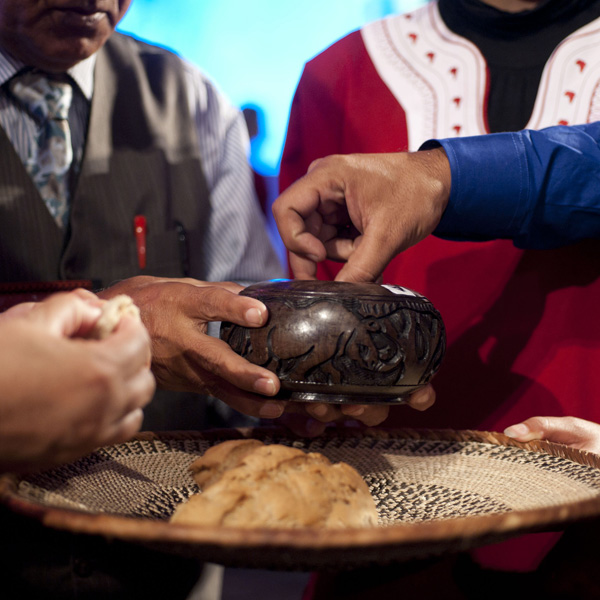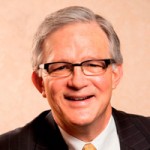In January 2004, I was doing research on the history of the Lausanne Movement at a library in Oxford University. On that particular day, I was reading a series of articles from 1984, a ten-year retrospective on the first Lausanne Congress. The way people were speaking about the Congress ten years after it had happened gave me a sense of just how significant it had been.
As I kept reading more about how God had used the Congress to energize the church for world evangelization and to birth so many partnerships, as well as reading The Lausanne Covenant, I began thinking, ‘It’s wonderful to read about history, but God, do it again. I’d like to be a part of history.’
No longer able to focus on my studies, I ended up walking to a courtyard at Oxford and sat there and prayed that winter evening, ‘God, do it again. Work in our time. Here am I. Use me.’
Then a couple weeks later, Paul Cedar, the Executive Chairman of Lausanne at that time, called and he said, ‘I’m thinking of stepping down in October at the 2004 forum, and as I pray, your name comes to my mind. I would like to nominate you to be the new Executive Chairman.’
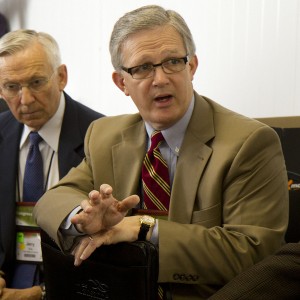
So I began thinking a lot about a Congress. Studying the histories of the great church councils, it was clear that they really only met when there was some precipitating crisis—an internal problem, heresy, or external pressures like persecution and hostility from other groups. Those warranted the church coming together.
It had been some 15 years since the last Lausanne Congress, which was really the last global congress on world evangelization. Thinking about the rapid pace of change, the external pressures, and internal problems of the church, I began sharing the idea.
‘It seems right to the Holy Spirit and to us’
In November 2005, I called together 25 leaders who were influential in every part of the world and also from the major streams of the church. There was enthusiastic and unanimous support for the idea, which only strengthened as months passed, and this group became the Advisory Council for the Congress.
Having gained enthusiasm from the core Lausanne leadership, the Board and International Deputy Directors (IDDs), we started to think about location. We had met in Lausanne, Switzerland, in 1974; in Manila, Philippines, in 1989; and we really needed a major gathering in Africa. So we traveled many countries and decided to consider a location in Cape Town, South Africa.
We were looking for four confirmations: the persuasion of the host committee that wanted to bring us to Cape Town, the support of the Christian leaders in the area, the support of the municipal government, and a trusting relationship with the hotel and convention bureau.
Having received all these confirmations, at our last meeting in Cape Town with a group of top leaders who would become known as the Cape Town Trust, Michael Cassidy turned to me and said, ‘Well, Doug, it seems right to the Holy Spirit and to us that the third Lausanne Congress should be in Cape Town in 2010.’ These were the exact same words that were spoken at the first meeting when we arrived. They were the bookends to our time in Cape Town.
Challenges, disappointments, and gracious heroes
There were many challenges on the way to Cape Town, particularly in the areas of communications, participant selection, fundraising, and programme. However, we were carried along by the Holy Spirit, and there was a sense of calling, and God’s confirmations. Ultimately the big challenge was not organizational, administrative, or financial, but it was the challenge of faith. ‘The one who called you is faithful, and he will do it’ (1 Thess 5:24). There were challenges, but that was to be expected. For all of us, it was a faith-building experience.
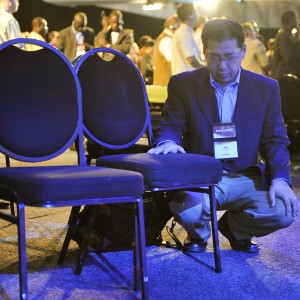
One of the biggest disappointments at the Congress was that the Chinese delegation was not able to participate. Many times before the Congress, I had said as I was sharing with people that one of the greatest reasons to go to the Congress was to simply interact with the leaders from China, to see their dynamism, creativity, and energy. We worked very closely with the best advisors we could find, but in the end, the Chinese delegates were all blocked from coming by the government at the highest levels.
The second or third day of the Congress was also when I got the news about the cyberattack. All the systems were down that were to connect 630 sites from around the world into a live experience of the Congress. We had thought about all kinds of security challenges and enlisted a global security expert, but had not anticipated a cyberattack. The technology team then worked around the clock for the rest of the Congress to catch up and get back in sync.
However, we also had other situations that led to new heroes of grace, notably the Latin American brothers and sisters who allowed the distribution of a conference resources CD, despite the fact that it included a video that could not be removed in time and which had represented Pentecostal and Catholic groups very poorly.
Successes and visible realities
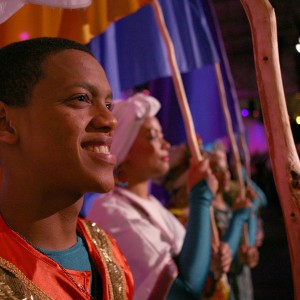
Cape Town 2010 was an experience of the physicality of 4,000 people from all over the world being in one place. It represented the demographic, theological, ecclesiastical realities of the global church. It was a microcosm of global evangelicalism, and with representatives from the Vatican, the Orthodox Church, and the World Council of Churches.
The shift in global Christianity was fully on display in Cape Town, like nothing else before it. By 2010, over 60% of Christians were in the majority world. To have a Congress where the Program Chair was an Egyptian, the Program Director was an Indian, the Participant Selection Chair was a Malaysian, and the Honorary Chairman of the Congress an Anglican bishop from Uganda, was a joyful embrace of this reality.
The worship team brought together varying styles of worship—liturgical, charismatic choruses, old hymns, songs, dance, instruments; it was just beautiful. During the closing ceremony, we worshipped the Lord with about 5,000 people who had been together for ten days. It was a powerful moment of anticipating our grand eschatological hope. Furthermore, we realized that the next day, we would all go back to 198 countries carrying that great hope and vision of what we strive for.
There was a tremendous waiting on God to build consensus as we planned for the Congress. During the time of Lausanne 1974, people did not have much experience of working together across church traditions or countries. At Lausanne 1989, there were times when delegations from certain regions were about to leave. Cape Town 2010 had twelve International Deputy Directors, a globally representative Board, and two senior statesmen from each region. It was not characterized by resentment or acrimony in terms of debate or interaction.
This dynamic was seen at the table groups; now one cannot imagine an international congress without table groups. Participants were not one of 4,000 people in a hall, with those from the same region sitting together, but they were one of six people in a community. It created a place where everyone had to be there, and they could share perspectives from all parts of the world.
Legacies
The Congress created an ongoing point of reference and identification. Recently I was on a conference call, and the person I spoke with referenced the Lausanne Movement in his bio. It has become a trusted way to recognize or reference a person as a significant thinker or leader, which is necessary in evangelicalism. Furthermore, of course, many organizations and mission organizations in particular have begun or renewed using The Lausanne Covenant as their statement of faith.
Many of the people who were committed to seeing the Congress become a reality also thought, ‘We don’t just want this to be a ten-day event and then it’s all over.’ There are numerous stories that I have heard since of initiatives that were started at Cape Town 2010, whether through encounters at a table group or just the spontaneity of people being together. Indeed these completely unplanned encounters have led to some very significant ministries. I think this is one of the most important legacies of Cape Town.
From the moment to the Movement
When I think about a mountain climber, the safe destination is not the peak of the mountain, but the base. The climber needs to get to the top and back, safely and alive.
Three years after the Congress, the Lausanne Movement met in Bangalore, India. There were 350 people and leaders involved in the Movement gathered there. All the bills had been paid, and a new Executive Director was being installed, as well as new members of the Board and international leadership. Consultations had taken place since Cape Town, were going to take place, and are taking place now.
We had gone from the moment, the grand moment which is highly visible, to the Movement which is really making the impact. We went down from the mountaintop back to the valley, and it gives me great satisfaction that now, five years after the event, there is such vitality in the Movement.
At Lausanne III, we were rebuilding the Movement. Toward the latter half of the Congress, Michael Oh and the team that had been involved in the 2006 Younger Leaders Gathering brought the younger leaders together. There were 800-900 younger leaders who gathered at 10:30 in the evening in a ballroom because the group was so large. I stood on a chair in the middle of the room to speak to this group that was filled with so much energy and enthusiasm. There was a sense of this generation wanting to identify with the Movement and the Congress.
As I was doing that winter evening in Oxford in 2004, today in 2015 there is a new generation learning about the history of the Movement, and the 2010 Cape Town Congress now has a place in it. Also there are again people around the world saying, ‘It’s wonderful to read about history, but God, do it again. Work in our time. Here am I. Use me.’
